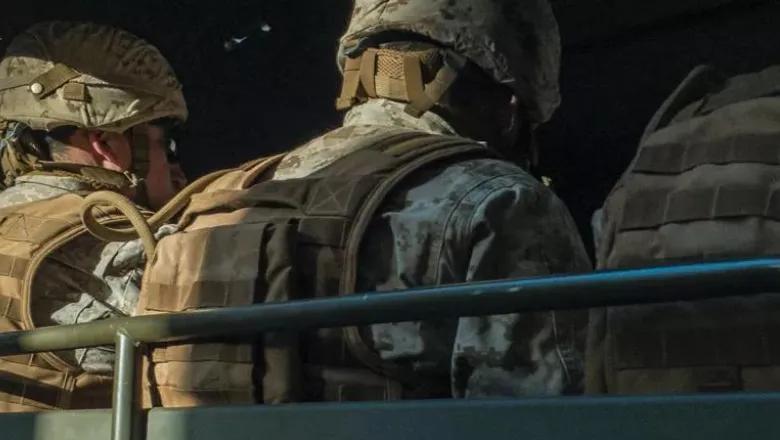“This study represents the latest stage of many years of research into the health and wellbeing of UK Armed Forces personnel. Two thirds of respondents reported no negative impact on their mental health. There is however a sizeable and growing minority in need of support. This cohort study has been essential to understand changes over time in this group and target support to those who most need it.”
Professor Nicola Fear, Director of the KCMHR and the report’s senior author
09 September 2024
20-year study finds rates of PTSD and common mental disorders on the rise in Armed Forces personnel and veterans
The latest research from the King’s Centre for Military Health Research (KCMHR), King’s College London and commissioned by the Office for Veterans’ Affairs (OVA) has found that rates of probable Post-Traumatic Stress Disorder (PTSD) and Common Mental Disorders (CMD) have increased among UK Armed Forces personnel, and ex-serving personnel (veterans) in particular.

The Office for Veterans’ Affairs Final Report: Health and Wellbeing Study of Serving and Ex-Serving UK Armed Forces Personnel: Phase 4. March 2024 can be found here.
The report is the fourth to have been commissioned, and represents the culmination of 20 years of research, established to investigate the impact of deployment to Iraq and Afghanistan on the health and wellbeing of UK Armed Forces personnel and has followed people up since 2004. It puts forward a series of recommendations, including calling for continued investment into Armed Forces and veteran mental health services, as well as a review in the current provision of treatment and care of complex PTSD (C-PTSD) and alcohol misuse.
4,104 current and ex-serving personnel of the Armed Forces responded to a detailed questionnaire exploring symptoms of Common Mental Disorders (CMD), probable PTSD, including C-PTSD, and alcohol misuse.
An analysis of the data found:
- 28% of respondents reported symptoms of CMD, up from 22% in 2014/16 and 20% in 2004/2006,
- 9% of respondents reported probable PTSD, up from 6% in 2014/16 and 4% in 2004/2006,
- Ex-serving Regular personnel reported higher probable PTSD rates than serving Regulars at 11% versus 7% respectively.
Higher rates of probable PTSD were also found in both Regular serving and ex-serving personnel for those who deployed in a combat role to Iraq or Afghanistan compared to those deployed in a combat support role. Alcohol misuse had seen declines in previous phases but appears to have levelled off remaining at a high level compared to the general population.
This is the first time that C-PTSD had been measured in this cohort providing essential new evidence. It is a subset condition of PTSD that is often brought about by experiencing long term or recurring traumatic events while also experiencing additional symptoms such as difficulty controlling your emotions. Researchers found that almost three quarters (72%1) of respondents with probable PTSD met the threshold for C-PTSD,
Dr Marie-Louise Sharp, Senior Research Fellow at KCMHR and the report’s lead author said, “PTSD is a potentially life changing condition that can be difficult to treat. Providing effective treatment to individuals with C-PTSD can be more complicated, as they can take more time to come forward and ask for help and are more likely to be managing a range of different mental illnesses. Services providing for ex-service personnel will need to assess how well they support and treat complex and comorbid health conditions.”
Dr Sharon Stevelink, a Reader in Epidemiology at the KCMHR and a senior author on the report said, “Overall, whilst most participants in the study remained well, for a minority, the study saw a continued impact of deployment and combat on their mental health outcomes and a higher risk of adverse outcomes experienced in ex-serving personnel compared to current serving personnel. We also found other factors in ex-serving personnel’s lives that impacted their mental health such as loneliness and caring responsibilities, hence we should acknowledge that adverse outcomes are not only related to deployment combat.”
Professor Sir Simon Wessley, Regius Professor of Psychiatry at King’s College London and one of the report’s authors concludes, “The cohort study continues to provide essential evidence for government, healthcare services and all those supporting the Armed Forces community. It is important that those who served during the era of conflicts in Iraq and Afghanistan continue to receive the support they require, recognising their sacrifices and unique mental health needs. Acknowledging the enduring impact of these conflicts on mental health offers valuable lessons for supporting both past and future generations of military personnel.”
Minister for Veterans and People, Al Carns said, “We are indebted to those who have made extraordinary sacrifices to protect our national security. A career in the Armed Forces is unlike any other and we recognise that our people are often presented with situations that can be physically and mentally challenging.
“The King’s College London Phase 4 Veterans Cohort Study report will not only allow us to further examine the effect on those who served in the Iraq and Afghanistan conflicts, it will also allow us to understand the impact of serving more widely.
“Although most of our personnel don’t experience mental health difficulties after deployment, we are committed to learning from this research to understand how we can better support our serving and veteran communities, providing the right help at the right time.
“I thank King’s College London for invaluable work and those serving personnel and veterans who contributed.”
This study was commissioned and funded by the Office for Veterans’ Affairs.
A full copy of the report can be read here.
Office for Veterans’ Affairs Final Report: Health and Wellbeing Study of Serving and Ex-Serving UK Armed Forces Personnel: Phase 4. March 2024 (Marie-Louise Sharp, Sofia Franchini, Margaret Jones, Ray Leal, Simon Wessely, Sharon A.M. Stevelink, Nicola T. Fear)
For more information, please contact Patrick O'Brien (Media Manager)





